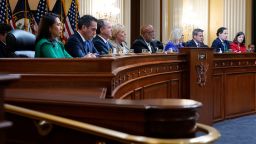The anticipated testimony of former President Donald Trump’s campaign manager Bill Stepien before the House January 6 committee was unexpectedly upended Monday when Stepien said he couldn’t appear due to a family emergency.
The development is “disruptive” to Monday’s hearing, a source familiar with the committee’s plans said, but the panel has been prepared for such contingencies and has at its disposal deposition video clips from Stepien’s earlier testimony.
Monday’s hearing, the House Jan. 6 committee’s second this month, will focus on Trump’s lies about the 2020 election.
House select committee aides said the hearing would scrutinize how Trump embraced false claims of fraud in the 2020 election and how he decided to declare victory in the hours after the election, even though he was told that the numbers didn’t bear it out.
Aides said that the hearing would show how Trump’s team pursued legal challenges in court and lost those cases, and that Trump then chose to ignore the will of the courts and continued to try to overturn the election.
The hearing will also seek to connect Trump’s lies about the election to the violence at the US Capitol on January 6, 2021, aides said, including how rioters echoed the former President’s baseless allegations that the election was being stolen.
Among those expected to testify is former Fox digital politics editor Chris Stirewalt, whose decision to call Arizona for Joe Biden on election night infuriated the Trump campaign — and conservative Fox hosts.
A second panel of witnesses testifying Monday includes former US attorney for the North District of Georgia BJay Pak, who was pressured to embrace Trump’s fraud claims and resigned; former Philadelphia city commissioner Al Schmidt, who debunked false claims about election fraud in Philadelphia; and conservative election attorney Ben Ginsberg, who is expected to speak about the failed court cases pursued by Trump’s team.
Stepien was perhaps the most intriguing witness, as a key member of Trump’s team during the 2020 campaign. He was set to appear under subpoena, he told CNN on Sunday.
Here are key things to watch during Monday’s hearing:
Debunking Trump’s fraud claims
The hearing is the second of seven that the January 6 committee has planned for this month as it lays out a case putting Trump at the center of the efforts to overturn the 2020 election and the violence that unfolded at the Capitol on January 6.
Monday’s hearing is focused on election fraud, and the committee seeks to demonstrate to the public that Trump’s claims that the 2020 election was stolen — which have been embraced by significant share of Republicans, including many GOP candidates running for office this year — are wrong.
More video from testimonies
Stepien’s role in the hearing — and what he has to say about election fraud —was anticipated to provide the most noteworthy moments on Monday. But aides said they also planned to play more video from closed-door interviews they’ve conducted with many in Trump’s orbit.
Those videos proved key in the committee’s opening hearing on Thursday, which previewed how the panel has been told that many of those around Trump knew his claims about election fraud were false.
A more traditional hearing
The first hearing featured two witnesses — a Capitol Police officer and a documentarian who was with extremist groups on Jan. 6 — but their testimony came after a lengthy presentation from committee Chairman Benny Thompson and Cheney that summarized the panel’s findings, as well as a lengthy video showing new footage from the violent attack on the Capitol.
Aides said Monday’s hearing would be a return to a more traditional congressional hearing, with the rest of the committee involved in asking questions and two panels of witnesses.
While Thompson will be leading the hearings, Rep. Zoe Lofgren, a California Democrat, is going to play a key role in Monday’s hearing that’s focused on voter fraud, aides said.
It’s a pattern that’s likely to continue with the rest of the committee members in future hearings as well, which will examine how Trump and his allies tried to pressure the Justice Department, state legislatures, and his former vice president, Mike Pence, to help try to overturn the election, as well as what the committee says is Trump’s role in inciting the Capitol riot and his failure to respond as the violence was unfolding.
CNN’s Katelyn Polantz contributed to this report.
Read more here.







